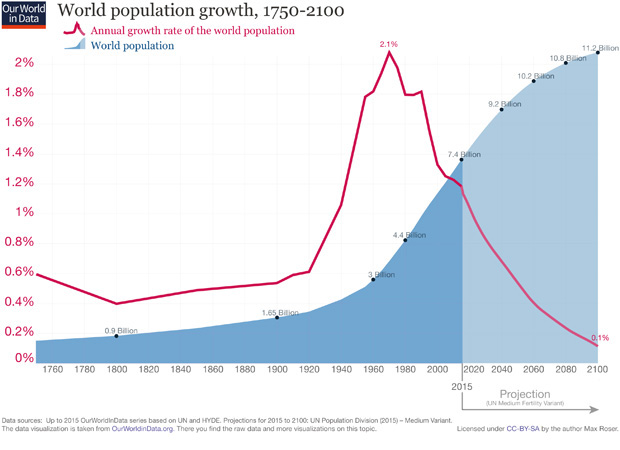Rethinking Lifestyle
The Problem of Growth

We are told that at the dawn of agriculture, which is believed to have occurred around 8000 B.C., there were approximately 5 million people on this earth. By the year 1500 this number had increased to about 450 million. Do the math and you will see that the annual growth rate was around 0.05%. Why, you may ask, such a low growth rate? Famine and plague! Without the means to store a lot of crop or to transport crop easily, a few consecutive years of crop failure results in famine. In a famine people die – sometimes many. Without an understanding of the germ theory and access to modern medicine, diseases like smallpox, influenza, bubonic plague easily became plagues and wipe out whole villages.
In other words, in spite of a high birth rate, in spite of no knowledge of birth control, the world population hardly increased. This was not because of planning or policy. It just happened. Just as the number of rabbits or deer in an area is limited by the food supply, disease and predation – sometimes increasing – sometimes decreasing, so also human population in local areas increased and decreased. Those of us who have read the Old Testament are familiar with stories of famine in those narratives.
But then something changed. It was the industrial revolution. So from 0.5 billion people when the industrial revolution began, the world population doubled to 1 billion in 400 years; by 1810. It doubled again to 2 billion by 1927. That doubling took just over 100 years. World population doubled again in 47 years. By 1974 there were 4 billion people on this earth. World population today is at 7.5 billion. What has allowed this explosive population growth? Human ingenuity. This growth has been possible because humans have been able to learn how to control disease and harness the deposited earth’s resources.
But that’s not all. The very human ingenuity that has made it possible for population to explode has also made it possible for each human to consume more of the earth’s resources. It may be true that most of the world population growth today is occurring in the less developed nations and that poorer families have more children – nevertheless most of the growth in consumption is occurring in the wealthy nations, and within those countries, by the more wealthy people.
So it seems we humans have been sufficiently intelligent to overcome the biology that for thousands of years has limited the size of our population. When you think about it, this is truly impressive. What remains to be seen is whether these same humans are sufficiently intelligent to overcome the greed that says “I am entitled to consume as much as I am able.” We know we cannot continue to grow! We cannot continue to consume more and more! So far the signs are that human intelligence will not overcome that greed. Few are the individuals willing to curb their consumption voluntarily, and even fewer are the countries willing to implement policies that discourage consumption. The implicit assumption of most government policy is that more consumption leads to more happiness; that growth will lead to happiness. Of course we all know this is not true, yet again and again we elect governments that promise economic growth and little else.
As we have said many times in this column, a major step toward sustainable living would be a tax shift from income to consumption. Why aren’t we making this shift? Are we waiting for political leadership to move us in that direction, or are the politicians waiting for us to tell them this is what we want?




